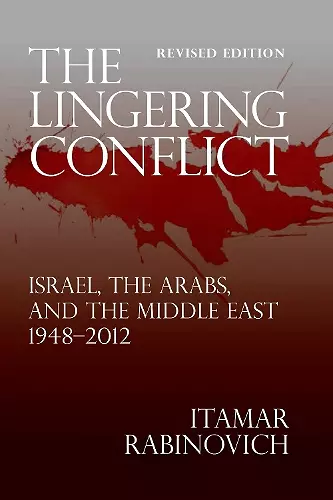The Lingering Conflict
Israel, The Arabs, and the Middle East 1948-2012
Format:Paperback
Publisher:Bloomsbury Publishing PLC
Published:27th Nov '12
Currently unavailable, and unfortunately no date known when it will be back

"There is no better guide than Itamar Rabinovich to the story of Israel and the Arabs over the past half-century. His careful chronicle of peacemaking efforts makes depressing reading, as a story of courageous efforts that failed and opportunities that were missed." --David Ignatius, columnist for the Washington Post and author of Blood Money " The Lingering Conflict reflects the author's keen strategic insights and the perspective gained as an important participant in key Arab-Israeli negotiations. With its informed analysis of the consequences of the Arab Spring, this book makes a major contribution toward understanding the tangled issues that stand in the way of Middle East peace." --Dr. Henry A. Kissinger, former U.S. secretary of state "[ The Lingering Conflict]... adopts the style of sweeping overview, stitching together the disparate strands of the domestic politics and diplomacy in each of the three key countries --Israel, Syria, and the United States. Given the unique dual vantage point from which Rabinovich was able to observe these developments, this book is a tour d'horizon of the peace process that should appeal to a broad public audience." --Ambassador Daniel Kurtzer, Princeton University
Provides insight into the prospects for genuine peace in the Middle East. This title explains the conflict between Israel and the Palestinians - a classic dispute between two national movements claiming the same land. It considers the broader political, cultural, and increasingly religious conflict between the Jewish state and Arab nationalism.
In The Lingering Conflict Itamar Rabinovich, a former chief negotiator for Israel, provides unique and authoritative insight into the prospects for genuine peace in the Middle East. His presentation includes a detailed insider account of the peace processes of 199296 and a frank dissection of the more dispiriting record since then.
Rabinovich's firsthand experiences as a negotiator and as Israel's ambassador to the United States provide a valuable perspective from which to view the major players involved. Fresh analysis of ongoing situations in the region and the author's authoritative take on key figures such as Ehud Barak and Benjamin Netanyahu shed new light on the long and tumultuous history of Arab-Israeli relations. His book is a shrewd assessment of the past and current state of affairs in the Middle East, as well as a sober look at the prospects for a peaceful future.
While Rabinovich explains the conflict between Israel and the Palestiniansa classic dispute between two national movements claiming the same land The Lingering Conflict also considers the broader political, cultural, and increasingly religious conflict between the Jewish state and Arab nationalism. He approaches the troubled region in an international context, offering provocative analysis of America's evolving role and evaluation of its diplomatic performance.
This book builds on the author's previous seminal work on geopolitics in the Middle East, particularly Waging Peace. As Rabinovich brings the Arab-Israeli conflict up to date, he widens the scope of his earlier insights into efforts to achieve normal, peaceful relations. And, of course, he takes full account of recent social and political tumult in the Middle East, discussing the Arab Spring uprisingsand the subsequent retaliation by dictators such as Syria's al-Asad and Libya's Qaddafiin the context of Arab-Israeli relations.
"There is no better guide than Itamar Rabinovich to the story of Israel and the Arabsover the past half-century. His careful chronicle of peacemaking efforts makesdepressing reading, as a story of courageous efforts that failed and opportunities thatwere missed." David Ignatius, columnist for the Washington Post and author of Blood Money
|"[ The Lingering Conflict] explains, in the author's characteristically clear and articulatestyle, everything that went wrong in the long years of negotiations in the variousarenas, though not overlooking the lone successes: the peace treaties with Egyptand Jordan." Haaretz
|" The Lingering Conflict reflects the author's keen strategic insights and the perspectivegained as an important participant in key Arab-Israeli negotiations. With its informedanalysis of the consequences of the Arab Spring, this book makes a major contributiontoward understanding the tangled issues that stand in the way of Middle East peace." Dr. Henry A. Kissinger, former U.S. secretary of state
|"[ The Lingering Conflict]... adopts the style of sweeping overview, stitching togetherthe disparate strands of the domestic politics and diplomacy in each of the three keycountries Israel, Syria, and the United States. Given the unique dual vantage pointfrom which Rabinovich was able to observe these developments, this book is a tourd'horizon of the peace process that should appeal to a broad public audience." Ambassador Daniel Kurtzer, Princeton University
|"What is particularly valuable in Rabinovich's new book is his analysis of the firstNetanyahu government (199699) in light of its later iteration, as well as the Olmertadministration (200609) and current Netanyahu government (2009present)." International Journal on World Peace
ISBN: 9780815724377
Dimensions: 229mm x 153mm x 21mm
Weight: 472g
326 pages
2nd edition